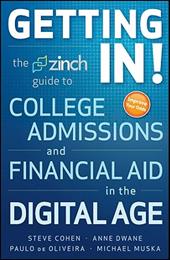 Few things in life are as difficult, nerve-wracking and simply mind-blowing as helping your son or daughter navigate through the wide sea of college selection. There are so many things to consider! Admissions: Will my son or daughter get into a good school? Cost: Can I afford the tuition? Schools: Which college or university will be right for our family?
Few things in life are as difficult, nerve-wracking and simply mind-blowing as helping your son or daughter navigate through the wide sea of college selection. There are so many things to consider! Admissions: Will my son or daughter get into a good school? Cost: Can I afford the tuition? Schools: Which college or university will be right for our family?
Something that many families fail to realize is that not only do the schools need to decide if the student is a right fit for the institution (based on application, test scores, etc.), but the student needs to determine if the school is right for him / her.
Websites, such as CollegeBoard.com offer plenty of good information that will help in the college selection process. You can see which schools are right for your child based on admissions requirements, areas of study and even location. College websites also offer a wealth of knowledge that will generally answer many commonly asked questions, such as cost, academic offering, test requirements for admissions and financial aid options. Many college and university websites also offer virtual tours where you can see the campus, the classrooms and common areas; some may offer a glimpse into what dorm life looks like.
Once you’ve narrowed your search based on the information available online and you have a list of schools that will be a good fit on paper, then it’s time to plan your college visit. Pictures will show what the campus looks like, but only with a visit will you know how it feels.
Most colleges and universities will offer an information session for prospective students and their parents, very often followed by a tour.
During the information session, many of the same details that you read on the school’s website will be discussed, but don’t forget that these sessions are an opportunity to dive deeper. Usually, it will be an admissions director leading the session, discussing things like program offerings, campus life and the admissions process. They may even discuss financial aid or have a representative from the school’s financial office there to answer questions.
The campus tour is where you’ll get a lot of great information not usually available online. Most campus tours are lead by current students who are well versed in everything the school has to offer. They’ll show you the highlights of the school’s campus, as well as give you an idea about academic routines and social life.
During the information session and tour, there are some key questions you should encourage your student to ask, questions like:
- What key factors do you consider when making your acceptance decisions? Some schools cut off applications solely based on test scores; others equally weigh everything, such as test scores, transcripts, essay and interview. Knowing this will help you better prepare for the actual application process and better establish your expectations. You can easily get the data related to this question online, but knowing the key factors that colleges consider will be a plus.
- What are some of the academic offerings outside of the classroom? Your son or daughter may know what field of study he or she wants to pursue, but even if they don’t, it’s good to know what the school can do for him / her beyond the lecture hall. Are there research opportunities or study-abroad programs? These things make for excellent educational opportunities and can help a student build up his / her resume.
- Is financial aid need-based or merit-based? This may not be an important question for everyone, but some schools offer only need-based financial aid, whereas others may offer both need- and merit-based financial aid. Merit-based financial aid may change as your student’s grades fluctuate throughout their college career, and it’s important for both you and your child to know how academics may affect his or her tuition.
- What is campus life really like? Do students stay on campus over the weekends? Is there easy transportation to the nearest town or urban center? Are there clubs and sports available based on your son’s / daughter’s interests? Is there Greek life on campus? Is it necessary or even possible to have a car on campus? The college experience is more than just lectures and studying. The social aspect is just as important and enriching to your child’s education, so it’s wise to find out as much as you can about it.
- Are academic advisers and faculty easily accessible and supportive? Your child won’t have you around to answer all of their questions and help them along the way, and being independent from parents in an important step in the process of maturing. But support is still needed. You’ll want the confidence of knowing that there’s a system in place to aid your child, helping them select courses, guiding them through their program of study and working with them to resolve any issues that may arise during their time at a school. Some colleges have a more hands-on approach, while others are a little less involved. Knowing your child and his / her needs will help you to determine the type of support he / she need to make it through school, and may be a big factor is the school selection process.
************
Today’s guest post was written by Sarah Fudin. Sarah currently works in community relations for the University of Southern California’s Master of Arts in Teaching program, which provides aspiring teachers the opportunity to earn a Masters degree in Teaching and Masters in TESOL. Outside of work Sarah enjoys running, reading and Pinkberry frozen yogurt.
 Last week I did a radio interview with Power Women Magazine about the college prep process and my Parents Countdown to College Toolkit. In it, I discussed the steps necessary to prepare for the admissions process, how to stay organized, and the 10 mistakes parents and students often make when applying to college.
Last week I did a radio interview with Power Women Magazine about the college prep process and my Parents Countdown to College Toolkit. In it, I discussed the steps necessary to prepare for the admissions process, how to stay organized, and the 10 mistakes parents and students often make when applying to college.







 IvyAlly was built around the idea that no one has the insight, experience, or recollection of how to get accepted into elite universities than those students who have just crossed the chasm and are now attending the school of their dreams.
IvyAlly was built around the idea that no one has the insight, experience, or recollection of how to get accepted into elite universities than those students who have just crossed the chasm and are now attending the school of their dreams.